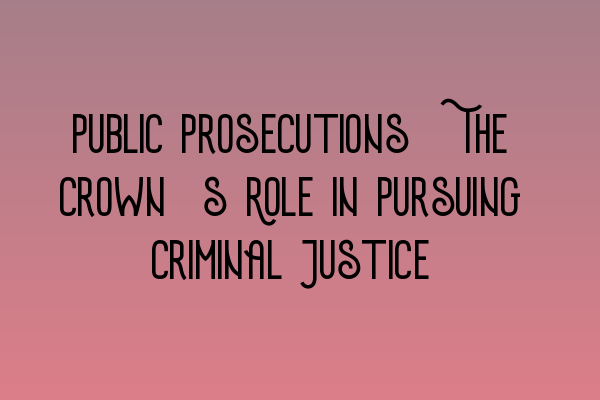Public Prosecutions: The Crown’s Role in Pursuing Criminal Justice
When it comes to criminal justice, the role of the Crown in public prosecutions cannot be underestimated. The Crown, as the representative of the state, has the responsibility to carry out these prosecutions on behalf of the public. This blog post will delve into the key aspects of public prosecutions and shed light on the important role played by the Crown.
The Criminal Prosecution Process
The process of a criminal prosecution involves several stages, each with its own significance. It begins with an investigation conducted by law enforcement agencies, such as the police. Once enough evidence is gathered, the case is forwarded to the Crown Prosecution Service (CPS) in England and Wales or the Crown Office and Procurator Fiscal Service (COPFS) in Scotland.
The CPS and COPFS are the bodies responsible for making decisions regarding prosecution. They carefully review the evidence provided by the police and decide whether there is enough evidence to proceed with a criminal trial. This review involves considering factors such as the strength of the evidence, the public interest, and the likelihood of securing a conviction.
The Role of the Crown
Once the decision to prosecute is made, the Crown takes on the role of bringing the case to court. The Crown’s primary duty is to act in the interests of justice and ensure that those who have committed crimes are held accountable for their actions. By prosecuting individuals who have broken the law, the Crown helps maintain public order and safety.
The Crown represents the state in criminal proceedings and acts as an impartial party. It presents the evidence against the accused, cross-examines witnesses, and makes submissions to the court. The Crown’s aim is to persuade the court to find the accused guilty based on the evidence presented.
The Importance of Public Prosecutions
Public prosecutions play a crucial role in upholding the rule of law and ensuring that justice is served. It allows the state to hold individuals accountable for their unlawful actions, which helps deter potential offenders and maintain public confidence in the legal system. The work of the Crown in prosecuting criminal cases contributes to a fair and just society.
Furthermore, public prosecutions send a message that criminal behavior will not be tolerated, and those who break the law will face the consequences. This helps protect society from harm, as individuals are deterred from committing crimes in fear of being prosecuted and punished.
Conclusion
The Crown’s role in public prosecutions is of utmost importance in pursuing criminal justice. By deciding whether to prosecute, presenting evidence, and advocating for the interests of justice, the Crown ensures that those who break the law are held accountable. Public prosecutions send a strong message that criminal behavior will not be tolerated, fostering a safer and more just society for all.
